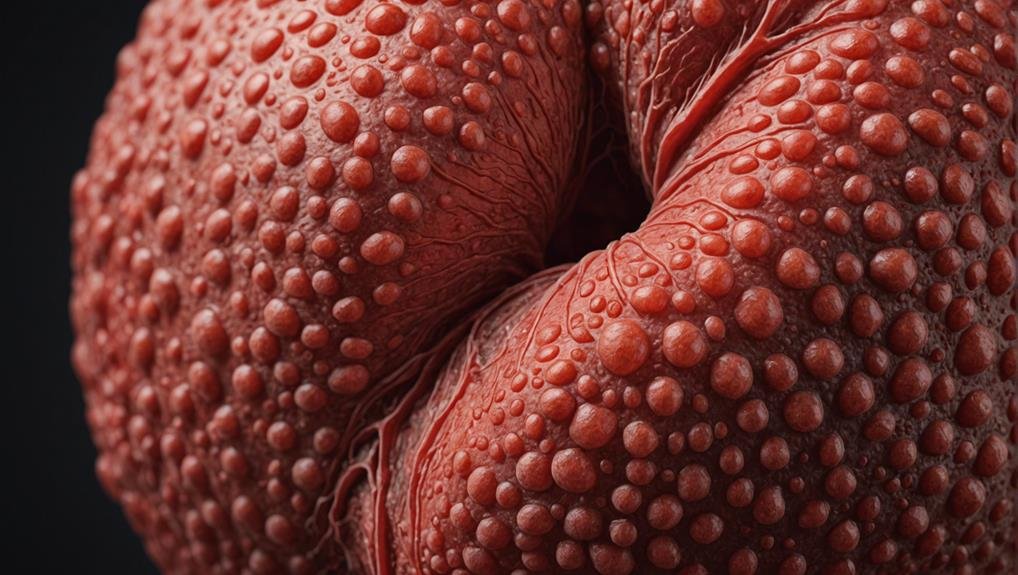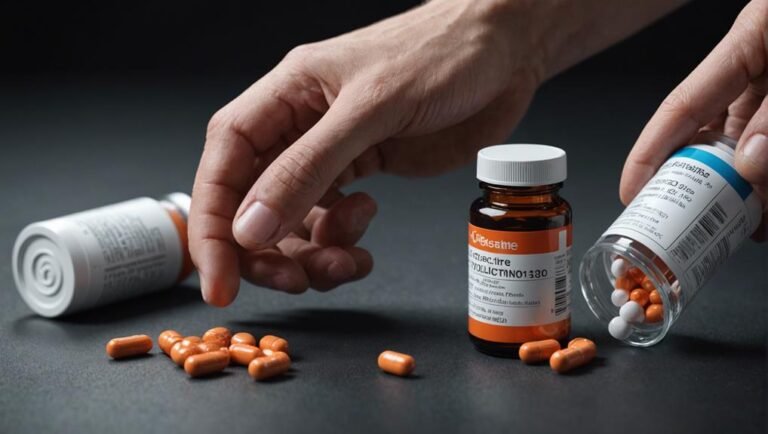Vulvar Skin Woes: Diagnosis and Care Essentials
If you’re dealing with vulvar skin issues, recognizing conditions like eczema or lichen sclerosus is essential for effective care. Seek guidance from specialists familiar with women’s skin health. Identifying irritants such as soap, fragrances, or latex can help manage symptoms. Treatment varies, with some cases needing corticosteroids. Postmenopausal women should be aware of hormonal shifts affecting vulvar skin. Seek personalized care plans for tailored treatment strategies. Understanding the nuances of different conditions and treatments is vital for relief and management.
Key Takeaways
- Symptoms crucial for diagnosis accuracy.
- Medical history aids in identifying issues.
- Physical examination essential for diagnosis.
- Biopsy may be necessary for accuracy.
- Laboratory tests help determine underlying causes.
Vulvar Skin Conditions Overview
When considering vulvar skin conditions, understanding the range of potential issues is essential for proper diagnosis and care. Diagnosis challenges often stem from the overlapping symptoms of conditions like eczema, psoriasis, lichen sclerosus, and lichen planus. To navigate these challenges effectively, incorporating skin care tips is vital.
Identifying irritants and allergens, such as soap, fragrances, and latex, is key to managing symptoms. Proper diagnosis involves examining symptoms, history, and skin appearance to differentiate between conditions. Treatment strategies vary, with some conditions requiring topical corticosteroids or high-potency ointments. Regular post-treatment examinations are necessary for certain conditions like lichen sclerosus.
Vulnerability in Postmenopausal Women
Understanding the impact of menopausal changes on vulvar skin conditions is especially important for postmenopausal women. Hormonal changes during menopause can have a profound effect on the vulvar skin, leading to increased skin sensitivity and vulnerability to various skin problems.
- Estrogen Decline: Menopausal hormonal shifts, particularly the decline in estrogen levels, can result in thinning of the vulvar skin and decreased lubrication.
- Increased Skin Sensitivity: Postmenopausal women may experience heightened sensitivity in the vulvar area, making them more susceptible to irritations and allergic reactions.
- Specialized Care: Seeking professional guidance from a gynecologist or dermatologist familiar with menopausal vulvar issues is essential for effective management and treatment.
Common Skin Problems
Common vulvar skin problems present a range of challenges that require careful diagnosis and tailored care for effective management. Consulting Piction Healthcare will help prevent irritation, redness, and allergic reactions.
Eczema is a common issue that can lead to discomfort and itching. Proper eczema management involves using prescribed topical corticosteroids and identifying triggers to prevent flare-ups.
Skin sensitivity tips include avoiding irritants like fragranced products, harsh detergents, and synthetic fabrics. Opt for gentle, unscented cleansers and moisturizers to maintain vulvar skin health.
If you experience persistent symptoms or worsening irritation, seek advice from a healthcare professional for a proper diagnosis and treatment plan.
Importance of Proper Diagnosis
Proper diagnosis is essential in effectively addressing vulvar skin conditions and ensuring appropriate treatment measures are implemented. It’s vital to understand the importance of accurate diagnosis to prevent misdiagnosis, which can lead to ineffective treatment and prolonged discomfort.
Here are three key reasons highlighting the significance of proper diagnosis:
- Precision: Accurate diagnosis helps identify the specific vulvar skin condition, allowing for targeted treatment approaches.
- Misdiagnosis Prevention: Proper diagnosis reduces the risk of mistaking one condition for another, ensuring the right treatment is provided promptly.
- Effective Treatment: A correct diagnosis enables healthcare providers to prescribe the most suitable medications and interventions, leading to better outcomes and symptom relief.
Identifying Irritants and Allergens
To effectively manage vulvar skin conditions, it is important to identify and avoid potential irritants and allergens that can exacerbate symptoms. Irritants like soap, bubble baths, and detergents can negatively affect the vulva, while allergens such as benzocaine, fragrances, and latex can trigger allergic reactions. Sensitivity to fabrics, vaginal secretions, and sweat can also lead to irritation. Symptoms of allergic reactions may manifest after exposure. Hence, understanding and steering clear of these irritants and allergens are key to maintaining vulvar health. Remember, taking proactive steps to avoid these triggers can greatly reduce the risk of experiencing discomfort and allergic reactions.
| Irritants | Allergens | Sensitivities |
|---|---|---|
| Soap | Benzocaine | Fabrics |
| Bubble baths | Fragrances | Vaginal secretions |
| Detergents | Latex | Sweat |
Anatomy and Care Tips
Identifying and avoiding irritants and allergens is essential to maintaining the health of your vulvar skin, moving now to discuss important anatomy and care tips for effective management.
Anatomy and Care Tips:
- Vulvar Hygiene: Proper hygiene involves using gentle, unscented cleansers and avoiding harsh soaps that can disrupt the vulvar pH balance.
- Moisturizing Techniques: After bathing, pat the vulvar area dry and apply a fragrance-free, hypoallergenic moisturizer to prevent dryness and irritation.
- Clothing Choices: Opt for loose-fitting cotton underwear to allow airflow and minimize moisture buildup, reducing the risk of skin irritation.
Diagnosis Strategies for Skin Woes
Diagnosing vulvar skin conditions requires a thorough assessment of symptoms, medical history, and visual examination by a healthcare professional. To accurately identify the underlying issue, diagnostic tests such as skin biopsies may be necessary. Skin biopsies involve taking a small sample of the affected skin for microscopic examination, aiding in distinguishing between different conditions like eczema, psoriasis, lichen sclerosus, and lichen planus.
Additionally, diagnostic tests can help rule out other potential causes and guide treatment decisions. Consulting with a healthcare provider skilled in vulvar dermatology is essential for an accurate diagnosis and appropriate management plan tailored to your specific condition. Trusting in professional expertise and undergoing recommended diagnostic procedures is crucial for resolving vulvar skin woes effectively.
Treatment Approaches for Relief
When managing vulvar skin conditions, the focus shifts to exploring effective treatment approaches for relief. Here are some strategies for managing vulvar skin conditions:
- Alternative Therapies: Consider alternative therapies like acupuncture or herbal remedies for symptom management.
- Hormonal Treatments: Discuss hormonal treatments with your healthcare provider to address underlying hormonal imbalances that may be contributing to your vulvar skin issues.
- Holistic Approaches: Embrace holistic approaches such as stress management techniques, dietary changes, and lifestyle modifications to support overall vulvar health.
Professional Care Importance
Professional care is essential for managing and treating vulvar skin conditions effectively. Expert consultation and medical intervention are crucial for accurate diagnosis and tailored treatment plans. When faced with persistent symptoms or uncertainty about your condition, seeking advice from a gynecologist or dermatologist is vital.
Self-treatment can lead to mismanagement, delaying proper care and potentially worsening the skin woes. Remember, over-the-counter remedies may not always be suitable for vulvar skin issues. A specialist’s review, such as that of Dr. Toni Golen, can offer expert guidance. Prioritizing professional care over self-diagnosis is key to effectively addressing vulvar skin problems and ensuring excellent health outcomes.
Expert Advice and Guidance
For expert guidance on managing vulvar skin conditions, consulting with a specialist like Dr. Toni Golen is crucial for accurate diagnosis and tailored treatment plans. Dr. Golen’s expertise in obstetrics and gynecology ensures that you receive personalized care for your specific needs.
Here are essential aspects of seeking specialized consultations and tailored solutions:
- Expert Recommendations: Dr. Golen can provide expert recommendations based on your symptoms and medical history.
- Personalized Care: Receive individualized care plans that address your unique vulvar skin issues.
- Tailored Solutions: Benefit from treatment strategies specifically tailored to manage your condition effectively.
Conclusion
In summary, prioritizing professional care for your vulvar skin conditions is vital for effective diagnosis and management.
While self-treatment may seem convenient, seeking expert advice from specialists like Dr. Toni Golen provides tailored guidance for your specific needs.
Remember, your vulvar health is essential, and investing in proper care now can lead to long-term relief and improved quality of life.
Trusting in professional expertise is key to addressing any skin problems in this sensitive area.







